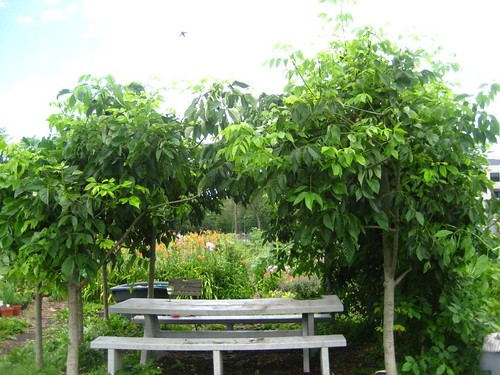
It wasn’t until mid-summer this year that I made it down to the 61st Street Farmers’ Market for the first time. In July, Purple Asparagus took part in the Market’s education program, the Market School. Since it was a little slow to start and we had some extra volunteers, I took the Market's manager, Dennis Ryan, up on his offer of a tour.
The Market is located on 61st Street in Woodlawn on Chicago's south side. Despite its proximity to the President's Chicago home and the University of Chicago, Woodlawn is a neighborhood with many needs. While it has made recent strides, it still suffers from higher poverty levels and lower access to fresh and healthy foods.

Experimental Station, a community organization determined to develop independent cultural infrastructure to Woodlawn, founded the Market with the intent of providing the community access to buy fresh, local farm products, supporting farmers and artisans, and promoting sustainable and organic agriculture. The 61st Street Market is outside from the beginning of May until the end of October. It moves inside to the Experimental Station’s event space during November and December and is looking to establish a year-round grocery to sell kitchen staples and Midwestern farm products.
The 61st Street Market isn’t a terribly large market, but definitely one on the rise. Last year was the market’s first. Within a year, it has doubled the number of vendors and has seen a steady growth of shoppers. Ryan estimated that it had about an average of 300 committed shoppers each week during the height of this year’s season. The market has a good selection of vendors including Tomato Mountain, Genesis Growers, Growing Power and Mint Creek. While small, it feels complete. You can buy bread, beef, chicken, eggs, cheese, lamb, and of course lots of fruit and vegetables. Ryan explained that when they designed the Market, the started with the farmers in mind and created a great market for them to sell their product. Their theory was that if the farmers come, the shoppers will follow.
This is not to suggest that the Market doesn’t have a lot to offer its shoppers. The Market leadership realized that, especially in an underserved neighborhood like Woodlawn, just locating the Market there was not going to be enough. It also needed to provide education for its shoppers. The Market has accomplished this through a couple different initiatives. The Market hosts chef demos, arranges for seasonal food tastings, and organizes a Market School, in-school workshops and weekly educational programming focusing on nutrition, healthy eating and sustainability.
Since its founding, the 61st Street Farmers’ Market has been determined to make fresh, clean produce more accessible and so it has actively publicized that it accepts WIC, food stamps, and the Farmers Market Senior Nutrition Program. Recently, the Market found a way to make it even more accessible to its low income customers. With funding from the Wholesome Wave Foundation, the 61st Street Farmers’ Market is the first Midwestern farmers’ market to offer a double value coupon to its shoppers. The program will double LINK benefits up to $25 per LINK cardholder per market when they shop at the Market. The Market’s press release quoted Experimental Station co-founder and Executive Director, Connie Spreen, as saying how excited she was “to be able to bridge the gap between the higher cost of organic and sustainably grown foods and the lower incomes of may of our local residents.”
Experimental Station runs a number of different projects to help solve other problems in the community. The Blackstone Bicycle Works is a youth education program that allows boys and girls age 9-16 to work in a bike shop, learning how to repair bikes and then earn their own once they’ve worked for 25 hours in the shop. It also provides space for Backstory, a women-owned coffee/tea house and operates a kitchen with a wood-fired oven that allows for community bread baking. Experimental Station also hosts a variety of cultural events. You can sign up for their mailing list, by visiting http://www.experimentalstation.org/contact. By doing so, you’ll receive a weekly email plus an invitation to the Market’s annual fundraiser. I didn’t attend this year, but after checking out the menu, which included Pork Liver Sausage from Avec, Pickled Lamb’s Tongue on Rye Crostini from Publican and Flora’s Confections, I won’t make that mistake again.

A great appeal to the Market is its setting. Just to the east of it is community garden giving the Market a semi-pastoral setting. The garden hosts row after row of individual plots, stocked with carrots, herbs, basil, chard and strawberries. Each patch reflects the personality of the keeper, some are wild, others tidy, a few incorporate ornamentation, others lawn chairs. In an open part of it, the garden has a small vine-covered pergola, seemingly perfect for coffee, lunch or an early evening glass of wine.



The University of Chicago had lent the property to the community with the understanding that the University would get it back when it wanted to build upon it. Earlier this year, the University announced its intention to reclaim the land despite the fact that it does not plan to erect anything on the site. Instead, the land will serve as temporary staging area for construction of the Chicago Theological Seminary building. A University spokesperson has suggested that, after construction, the land may become a parking lot.

According to Connie Spreen, Executive Director of Experimental Station, the University has claimed that allowing the garden to remain during construction would create a safety risk. Spreen questions the University’s rationale given that the garden remained open during the construction of the Helmut Jahn-designed chiller plant adjacent to the University’s Steam Plant on 61st Street and Dorchester. Spreen has asked the University to engage in a dialogue about a broader view of sustainability to discuss how its decision to destroy the garden will impact the community and how, if it were to allow the garden to remain, the garden could ultimately be part of a sustainable plan that would connect the community and the University. According to Spreen, the University has yet to agree to participate in such a conversation and instead has set October 30 as the deadline for all 135 households who garden on the site to vacate their plots.

While Spreen is working in the 11th hour to facilitate a conversation or summon a miracle, some gardeners are contemplating how to move their plants. Others are talking about their experience with The Invisible Institute in the Garden Conversations. According to writer, interviewer and soon-to-be-displaced gardener, Jamie Kalven:

"We see this as an exercise in hope as well as grief. Although we have been unable to dissuade the University from its course, we hold fast to the hope that we, and perhaps others, can learn from this situation. Amid promising developments elsewhere--from the White House vegetable garden to innovative composting operations at elite universities to the proliferation of community gardens and farmers markets across the country--we should not underestimate the potential contribution of a well-documented negative example. That, it appears, will be the final harvest from this lovely urban space that has enriched the lives of so many."

I'm quite certain that the University of Chicago has not seen the irony of requiring vacation of the garden the day before Halloween. The garden will be empty on All Hallow's Eve. The graves of garden plots ripped open and exposed. I imagine a host of ghosts consoling each other and reminiscing in whispers about a decade of growing and dying, all the while wishing to see another season of rebirth that under current circumstances will not occur.
Click here for a video of Purple Asparagus' session at the Market School.







This post was pretty fabulous for many reasons...loved the analogy:)
ReplyDeleteAwesome....except for the U of Chicago part closing the garden. :(
ReplyDeleteNext summer, Purple Asparagus ought to make an appearance at all 37 of Chicago's Farmer's Markets.
Tim Magner